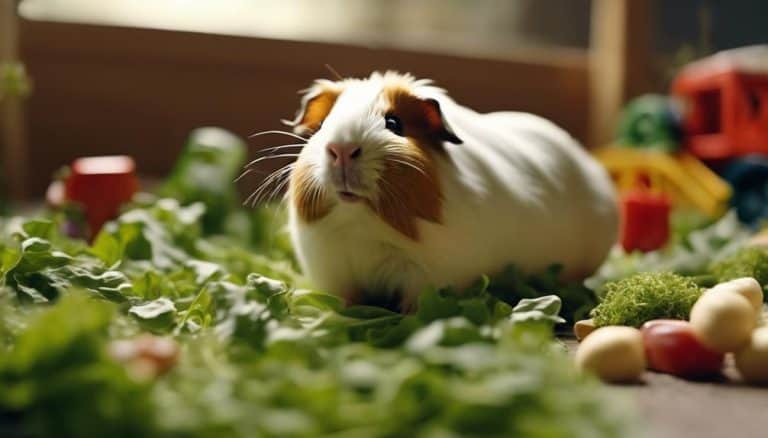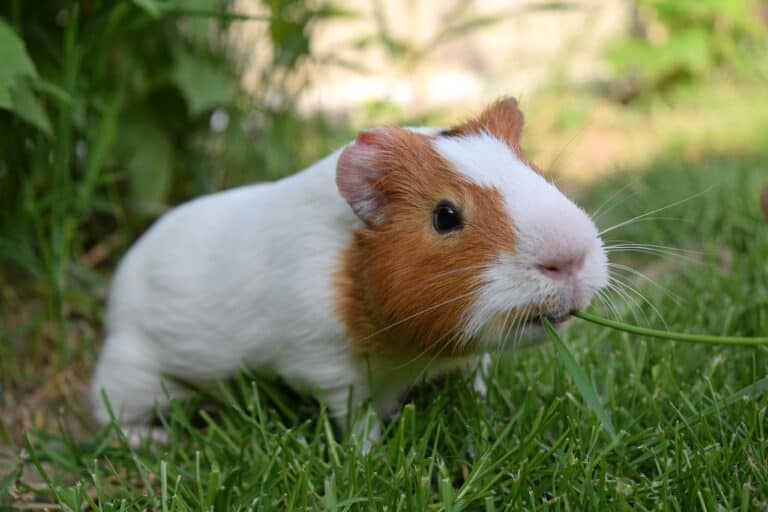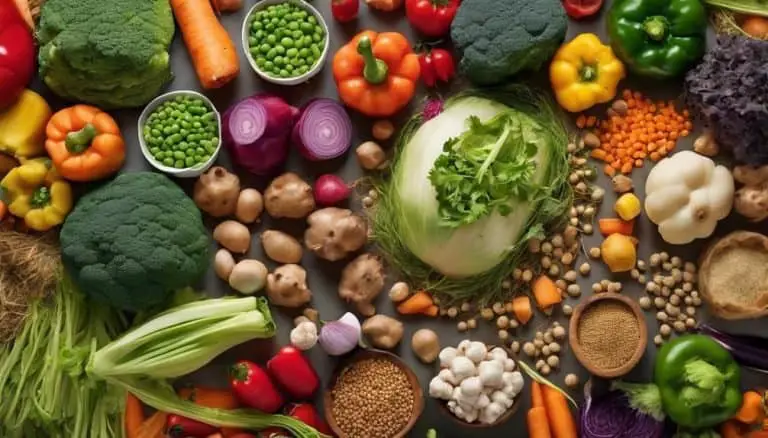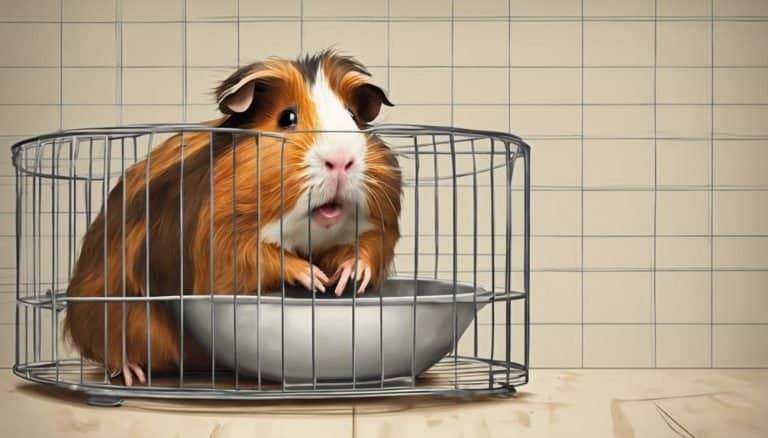Can Chinchillas Eat Guinea Pig Food
Have you ever wondered if chinchillas can eat guinea pig food? Well, we’ve got the scoop! Contrary to popular belief, chinchillas and guinea pigs have different nutritional needs. Feeding chinchillas guinea pig food can lead to potential health risks.
In this article, we’ll explore the importance of a balanced diet for chinchillas and provide safe alternatives to guinea pig food. So, join us as we delve into the fascinating world of chinchilla nutrition and discover what’s best for our furry friends.
Key Takeaways
- Chinchillas require a high-fiber diet with limited fat and protein, while guinea pigs need a diet rich in vitamin C and a variety of fresh fruits and vegetables.
- Feeding chinchillas guinea pig food can lead to digestive issues, vitamin C deficiency, obesity, and dental problems.
- A balanced diet for chinchillas includes hay, fresh vegetables, and safe alternatives to guinea pig food like pelleted chinchilla food and leafy greens.
- When transitioning chinchillas to a new diet, it is important to introduce new foods gradually, monitor their reaction, and avoid toxic human foods.
Nutritional Differences Between Chinchillas and Guinea Pigs
In terms of nutrition, we need to be aware of the differences between chinchillas and guinea pigs when it comes to their food. A comparison of their dietary needs reveals distinct requirements for each species. Chinchillas are herbivores and have specific dietary needs that are essential for their health. They require a diet high in fiber, with limited amounts of fat and protein.
Their digestive systems are sensitive and cannot tolerate foods that are high in sugar or carbohydrates. On the other hand, guinea pigs are also herbivores but have different dietary requirements. They need a diet rich in vitamin C, as they cannot produce it themselves. Additionally, guinea pigs need a variety of fresh fruits and vegetables in their diet to ensure they receive all the necessary nutrients. Understanding these differences is crucial to providing optimal nutrition for both chinchillas and guinea pigs.
Potential Health Risks of Feeding Chinchillas Guinea Pig Food
Feeding our chinchillas guinea pig food can pose potential health risks. While chinchillas and guinea pigs may seem similar, their dietary needs differ significantly. Here are three reasons why chinchillas should not consume guinea pig food:
- Digestive Issues: Chinchillas have a unique digestive system that requires a high-fiber diet to maintain optimal health. Guinea pig food often lacks the necessary fiber content, leading to digestive problems like diarrhea and bloating.
- Vitamin C Deficiency: Unlike guinea pigs, chinchillas are capable of producing their own vitamin C. Therefore, feeding them guinea pig food, which is typically fortified with extra vitamin C, can lead to an excess intake of this nutrient, potentially causing health issues.
- Obesity and Dental Problems: Guinea pig food is often higher in fat and sugar content compared to chinchilla-specific diets. Feeding chinchillas guinea pig food regularly can lead to weight gain and dental problems, such as overgrown teeth.
To ensure the well-being of our chinchillas, it is crucial to provide them with a diet specifically formulated for their unique dietary needs.
The Importance of a Balanced Diet for Chinchillas
To maintain our chinchillas’ optimal health, we must ensure they receive a balanced diet that meets their specific nutritional needs. One crucial component of their diet is hay, which serves multiple purposes. Hay provides essential fiber that aids in digestion and prevents gastrointestinal issues. It also helps wear down their constantly growing teeth, preventing dental problems.
Fresh vegetables are another important component of a chinchilla’s diet. They provide essential vitamins and minerals that support overall health and strengthen the immune system. However, it’s crucial to introduce new vegetables gradually to avoid digestive upset. Here is a table highlighting some nutritious vegetables suitable for chinchillas:
| Vegetables | Benefits |
|---|---|
| Leafy greens | High in vitamins and fiber |
| Bell peppers | Rich in vitamin C |
| Carrots | Good source of beta-carotene |
Ensuring a balanced diet with hay and fresh vegetables will help keep our chinchillas healthy and happy.
Safe Alternatives to Guinea Pig Food for Chinchillas
We can explore alternative options that are safe and suitable for our chinchillas’ diet. While guinea pig food may seem like a convenient choice, it may not fulfill all of a chinchilla’s dietary requirements. Here are some safe alternatives to consider:
- Pelleted chinchilla food: Specifically formulated for chinchillas, these pellets provide a balanced mix of nutrients and fiber.
- Fresh hay: An essential part of a chinchilla’s diet, hay should make up the majority of their food intake. Timothy hay is a popular choice.
- Fresh vegetables: Chinchillas can enjoy a variety of leafy greens such as kale, spinach, and romaine lettuce. These provide important vitamins and minerals.
How to Transition Chinchillas to a New Diet
As owners, it is important for us to gradually introduce new foods into our chinchillas’ diet to prevent digestive upset. When transitioning chinchillas to a new diet, it is crucial to do so slowly and methodically. Chinchillas have sensitive digestive systems, and sudden changes in their diet can lead to gastrointestinal issues.
To introduce new foods, start by offering small amounts alongside their regular diet. This allows their digestive system to adjust gradually. Monitor their reaction to the new food, looking for any signs of discomfort or digestive upset. If they tolerate it well, gradually increase the amount over time.
It is also important to research and understand which foods are safe for chinchillas, as some human foods can be toxic to them. By following a gradual and cautious approach, we can ensure a smooth transition and maintain the health and well-being of our chinchillas.
Conclusion
In conclusion, chinchillas should not be fed guinea pig food due to their different nutritional needs. This can lead to potential health risks and imbalances in their diet. It is important to provide chinchillas with a balanced diet that includes essential nutrients and vitamins. Safe alternatives to guinea pig food can be found to ensure the well-being and longevity of these adorable furry creatures. Remember, a healthy chinchilla is a happy chinchilla!







